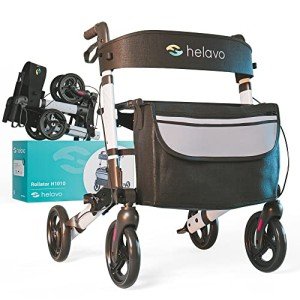20 Truths About Senior Walker: Busted
A Comprehensive Guide to Medical Walkers: Enhancing Mobility and Independence
In the world of healthcare, mobility plays an important function in rehab and overall wellness, especially for seniors and those recuperating from injuries. Amongst the myriad of mobility aids readily available today, medical walkers stand apart as flexible tools that help with motion and boost independence. mouse click the following web site will look into the types, benefits, considerations, and FAQs relating to medical walkers.
What is a Medical Walker?
A medical walker, often referred to as a walking frame, is a supportive device designed to help people with mobility difficulties walk with greater stability and ease. Walkers offer a more comprehensive base of support compared to walking sticks and crutches, making them perfect for those with balance concerns or limited strength.
Types of Medical Walkers
Type
Description
Features
Requirement Walker
A fundamental four-legged frame without wheels, used primarily for stability.
Lightweight, tough, adjustable height, appropriate for indoor and outdoor usage.
Wheeled Walker (Rollator)
A walker with wheels on the front legs, enabling much easier motion.
Geared up with hand brakes, a seat for resting, and storage alternatives.
Hemi Walker
A walker developed for people who can use one arm and require support.
Lightweight and compact, features a curved deal with for much easier gripping.
Bariatric Walker
Developed for bigger individuals, using increased weight capacity and stability.
Enhanced resilience, wider frame, and supportive features for much heavier users.
Knee Walker
A distinct choice for those with leg injuries, permitting them to rest the knee.
A platform to support the hurt leg, steering abilities, and brakes.
Advantages of Using a Medical Walker
- Enhanced Stability: Walkers provide extra points of contact with the ground, leading to a more stable walking experience.
- Increased Independence: Users can browse their environment without needing assistance, enhancing self-confidence and self-reliance.
- Enhanced Safety: The threat of falls is considerably reduced, as walkers offer support to those with balance concerns.
- Flexible Usage: Many walkers are created for both indoor and outdoor use, adjusting to different surfaces.
- Assistance during Rehabilitation: Medical walkers are invaluable during recovery from surgical treatments, injuries, or health problems.
Factors to consider When Choosing a Medical Walker
When choosing a medical walker, different aspects must be born in mind:
Consideration
Description
User's Condition
Evaluate the individual's strength, coordination, and specific requirements.
Devices Weight
Guarantee the walker is lightweight enough for easy handling however durable enough for support.
Adjustable Height
The walker must be adjustable to fit the user's height for optimal convenience and functionality.
Hand Grip Comfort
Check that the grips are comfortable to hold for extended durations.
Weight Capacity
Make sure the walker can support the user's weight, particularly for bariatric walkers.
Storage Needs
Figure out if extra features like baskets or trays are required for bring products.
Frequently Asked Questions (FAQs)
*How do I figure out if I need a walker?If you experience difficulty in preserving balance, feel unsteady walking, or need assistance on flat surfaces or inclines, it's a good idea to consult a health care professional for an evaluation. Can I utilize a walker outdoors?Yes, specifically developed walkers with bigger wheels(wheeled walkers or rollators)appropriate for outdoor usage and can handle numerous terrains effectively. How do I keep my walker?Regularly examine the walker for loose parts, ensure wheels are lubricated if
suitable, and clean it as needed. Seek advice from
the producer's standards for particular maintenance instructions. Are walkers covered by insurance?Many insurance plans offer coverage for walkers, but it is necessary to check with your supplier to comprehend your specific policydetails. Can a walker aid with physical therapy?Yes, utilizing
a walker can support rehab efforts by providing stability throughout workouts advised by physiotherapists. Medical walkers are indispensable tools that notjust assist in movement and self-reliance but also considerably enhance the quality of life for people facing mobility obstacles. With various types offered, choosing the best walker is **
essential to meeting specific requirements. The journey to restoring mobility can be challenging, but with the ideal devices and support, individuals can overcome barriers and recover their independence. By comprehending the types of walkers, their advantages, and important considerations, users can make informed options— causing a much safer, more positive method of moving through life. Whether it's a rollator for outdoor adventures or a simple walker for indoor navigation, the right walker can open doors to newfound freedom and improvement in life. 